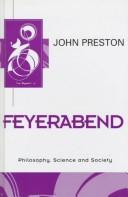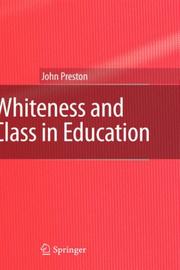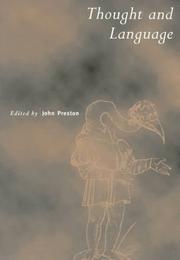| Listing 1 - 10 of 194 | << page >> |
Sort by
|

ISBN: 0745616763 9780745616766 Year: 1997 Publisher: Cambridge Polity
Abstract | Keywords | Export | Availability | Bookmark
 Loading...
Loading...Choose an application
- Reference Manager
- EndNote
- RefWorks (Direct export to RefWorks)
Philosophy of science --- Feyerabend, Paul --- Feyerabend, Paul, --- Feyerabend, P. K. --- Feyerabend, Paul Karl --- Feyerabend, Paul, - 1924-1994

ISBN: 1280969814 9786610969814 1402061080 1402061072 9048123070 Year: 2007 Publisher: Dordrecht : Springer,
Abstract | Keywords | Export | Availability | Bookmark
 Loading...
Loading...Choose an application
- Reference Manager
- EndNote
- RefWorks (Direct export to RefWorks)
The critical study of whiteness has influenced anti-racist pedagogy and research. A volatile area of study, in terms of the re-centering of white discourses and the appropriation of the writings of black scholars, confronting whiteness has become a controversial but potentially radical way of approaching educational issues. In this pioneering volume critical whiteness studies is applied in the United Kingdom in a variety of educational contexts. Although whiteness is considered to be a system of oppression that benefits white students and teachers in educational arenas it is not necessarily monolithic. Whiteness is flexible and inflected by class to produce new ‘whiteness(es)’ that are no less racist in intent or practice. Through the use of ethnographic, biographical and documentary research how whiteness ‘works’ in education is revealed. The ways in which working class whites are represented as ‘white trash’ or ‘chav’; the subtle actions of white middle class learners to reduce diversity in adult education and the pre-modern qualities of white ruling class schooling are used to highlight both divergence and congruence in the racial formation of whiteness. Policy issues are also considered, in particular the merits of regulating ‘hate speech’ in universities and the ways in which racist ‘civil defence pedagogies’ have become embedded in educational and homeland security policies. However, this book does not just consider the practices of whiteness but also how practitioners might consider critical whiteness studies in anti-racist practice. It is concerned with not only identifying how ‘white supremacy’ continues to dominate educational discourse and practice but how it can be resisted.
Educational sociology --- Education --- Multicultural education. --- Whites --- Social classes --- Social aspects --- Race identity. --- Race identity of whites --- Racial identity of whites --- Whiteness (Race identity) --- Race awareness --- Intercultural education --- Culturally relevant pedagogy --- Ethnic identity --- Education, Higher. --- Sociology of Education. --- Higher Education. --- College students --- Higher education --- Postsecondary education --- Universities and colleges --- Educational sociology. --- Higher education. --- Education and sociology --- Social problems in education --- Society and education --- Sociology, Educational --- Sociology --- Aims and objectives

ISSN: 13582461 ISBN: 0521587417 0511563787 9780521587419 9780511563782 Year: 1997 Volume: 42 Publisher: Cambridge Cambridge University Press
Abstract | Keywords | Export | Availability | Bookmark
 Loading...
Loading...Choose an application
- Reference Manager
- EndNote
- RefWorks (Direct export to RefWorks)
The relationship between thought and language has been of central importance to philosophy ever since Plato characterised thinking as 'a dialogue the soul has with itself'. In this volume, several major twentieth-century philosophers of mind and language make further contributions to the debate. Among the questions addressed are: is language conceptually prior to thought, or vice versa? Must thought take place 'in' a medium? To what extent can creatures without language be credited with thoughts? Do we have to suppose that thinking involves the use of concepts? What does it mean to have and deploy a concept? How do recent psychological experiments bear on these issues? Are beliefs, desires, hopes and fears rightly construed as 'attitudes towards propositions'? Should twentieth-century philosophy be conceived of in terms of Michael Dummett's distinction between 'analytical philosophy' and the 'philosophy of thought'?
Philosophy of language --- Thought and thinking --- Language and languages --- Congresses --- Philosophy --- -Thought and thinking --- -Mind --- Thinking --- Thoughts --- Educational psychology --- Psychology --- Intellect --- Logic --- Perception --- Psycholinguistics --- Self --- Foreign languages --- Languages --- Anthropology --- Communication --- Ethnology --- Information theory --- Meaning (Psychology) --- Philology --- Linguistics --- -Congresses --- -Philosophy --- Arts and Humanities --- Thought and thinking - Congresses --- Language and languages - Philosophy - Congresses
Book
ISBN: 0435187201 9780435187200 Year: 1970 Publisher: London
Abstract | Keywords | Export | Availability | Bookmark
 Loading...
Loading...Choose an application
- Reference Manager
- EndNote
- RefWorks (Direct export to RefWorks)
English literature --- anno 1700-1799 --- English fiction --- Roman anglais --- History and criticism --- Histoire et critique --- Authors and readers --- Psychological fiction, English --- Reader-response criticism --- Self in literature --- History --- -Authors and readers --- -Psychological fiction, English --- -Reader-response criticism --- Reader-oriented criticism --- Reception aesthetics --- Criticism --- Reading --- English psychological fiction --- Readers and authors --- Authorship --- -History and criticism --- Reader-response criticism. --- Self in literature. --- History and criticism. --- English fiction - 18th century - History and criticism --- Authors and readers - Great Britain - History - 18th century --- Psychological fiction, English - History and criticism
Book
ISBN: 0874517818 Year: 1995 Publisher: Hanover : University Press of New England,
Abstract | Keywords | Export | Availability | Bookmark
 Loading...
Loading...Choose an application
- Reference Manager
- EndNote
- RefWorks (Direct export to RefWorks)
Fonds Suzan Daniel (FSD)
Book
ISBN: 9460918719 1283908131 9460918735 9460918727 9789460918735 9789460918711 9789460918711 9789460918728 Year: 2012 Publisher: Rotterdam Boston SensePublishers
Abstract | Keywords | Export | Availability | Bookmark
 Loading...
Loading...Choose an application
- Reference Manager
- EndNote
- RefWorks (Direct export to RefWorks)
From ‘Duck and Cover’ in the 1950's, when American schoolchildren were instructed to hide beneath their desks in the event of nuclear attack to contemporary campaigns against pandemic flu, education campaigns have been used to prepare the general public for apocalyptic events. Governments have made use of various media from films, leaflets and television to the internet to inform, inspire and scare populations. Forms of disaster education also permeate popular culture with films and television programmes illustrating survival techniques from dealing with terrorist attacks in ‘24’ to thwarting zombie apocalypse in ‘The Walking Dead’ and ’28 Days Later’ . Using critical race theory and whiteness studies the book argues that information about disasters has always, tacitly or overtly, prioritized the survival of certain groups of citizens above others. Drawing on examples from the UK and the US, from past and contemporary disaster education and popular culture, it considers that rather than being kitsch, naïve and ephemeral, such campaigns are central to the way in which states define survival, life and death. The book will be of interest to educationalists, historians, sociologists and cultural theorists as well as those working in emergency planning, public health and communications.
Disasters -- Study and teaching. --- Emergency management -- Study and teaching. --- Education --- Social Welfare & Social Work --- Social Sciences --- Social Welfare & Social Work - General --- Education - General --- Emergency management --- Disasters --- Study and teaching. --- Calamities --- Catastrophes --- Consequence management (Emergency management) --- Disaster planning --- Disaster preparedness --- Disaster prevention --- Disaster relief --- Emergencies --- Emergency planning --- Emergency preparedness --- Management --- Planning --- Preparedness --- Prevention --- Education. --- Education, general. --- Children --- Education, Primitive --- Education of children --- Human resource development --- Instruction --- Pedagogy --- Schooling --- Students --- Youth --- Civilization --- Learning and scholarship --- Mental discipline --- Schools --- Teaching --- Training --- Curiosities and wonders --- Accidents --- Hazardous geographic environments --- Public safety --- First responders
Book
ISBN: 043518721X Year: 1970 Publisher: London Heinemann
Abstract | Keywords | Export | Availability | Bookmark
 Loading...
Loading...Choose an application
- Reference Manager
- EndNote
- RefWorks (Direct export to RefWorks)
Book
ISBN: 3319551108 3319551094 Year: 2017 Publisher: Cham : Springer International Publishing : Imprint: Palgrave Macmillan,
Abstract | Keywords | Export | Availability | Bookmark
 Loading...
Loading...Choose an application
- Reference Manager
- EndNote
- RefWorks (Direct export to RefWorks)
This book radically counters the optimism sparked by Competence Based Education and Training, an educational philosophy that has re-emerged in Schooling, Vocational and Higher Education in the last decade. CBET supposedly offers a new type of learning that will lead to skilled employment; here, Preston instead presents the competency movement as one which makes the concept of human learning redundant. Starting with its origins in Taylorism, the slaughterhouse and radical behaviourism, the book charts the history of competency education to its position as a global phenomenon today, arguing that competency is opposed to ideas of process, causality and analog human movement that are fundamental to human learning.
Education. --- Philosophy and social sciences. --- Educational policy. --- ducation and state. --- Educational sociology. --- Assessment. --- Education and sociology. --- Sociology, Educational. --- Learning & Instruction. --- Philosophy of Education. --- Educational Policy and Politics. --- Sociology of Education. --- Assessment, Testing and Evaluation. --- Education, Higher. --- Humanity. --- College students --- Higher education --- Education --- Ethics --- Postsecondary education --- Universities and colleges --- Educational tests and measuremen. --- Philosophy. --- Learning. --- Instruction. --- Education and state. --- Educational sociology . --- Education and sociology --- Social problems in education --- Society and education --- Sociology, Educational --- Sociology --- Education policy --- Educational policy --- State and education --- Social policy --- Endowment of research --- Social sciences and philosophy --- Social sciences --- Learning process --- Comprehension --- Aims and objectives --- Government policy
Book
ISBN: 3319968513 3319968505 Year: 2019 Publisher: Cham : Springer International Publishing : Imprint: Palgrave Pivot,
Abstract | Keywords | Export | Availability | Bookmark
 Loading...
Loading...Choose an application
- Reference Manager
- EndNote
- RefWorks (Direct export to RefWorks)
The Grenfell Tower fire of June 2017 is one of the most tragic political events in British history. This book argues that preparedness for disasters has always been designed in the interests of the State and Capital rather than citizens. This was exemplified by the ‘stay put’ strategy at Grenfell Tower which has historically been used to socially control racialised working class groups in a disaster. ‘Stay put’, where fire safety is compromised along with strategic ambiguity, probabilistically eliminates these groups. Grenfell Tower is a purposive part of ‘Disaster Capitalism’, an asocial racial and class eliminationism, where populations have become unvalorisable and disposable. We have reached a point where even the ruling class are fleeing from the disasters and chaos they have inflicted on the world, retreating to their billionaire bunkers. This timely book will be of interest to sociologists, social theorists and activists in understanding the racialised, classed and capitalist nature of contemporary disasters.
Racism in the social sciences. --- Citizenship—Sociological aspects. --- Social Structure, Social Inequality. --- Sociology of Racism. --- Sociology of Citizenship. --- Social sciences --- Social structure. --- Social inequality. --- Egalitarianism --- Inequality --- Social equality --- Social inequality --- Political science --- Sociology --- Democracy --- Liberty --- Organization, Social --- Social organization --- Anthropology --- Social institutions --- Grenfell Tower (London, England) --- Equality.
Book
ISBN: 1443867993 1322179921 9781322179926 9781443867993 Year: 2013 Publisher: Newcastle upon Tyne : Cambridge Scholars Publishing,
Abstract | Keywords | Export | Availability | Bookmark
 Loading...
Loading...Choose an application
- Reference Manager
- EndNote
- RefWorks (Direct export to RefWorks)
Even in those areas of academia which one would consider to be most resistant to white domination (such as critical race theory and multicultural education), both covert and overt racial oppression are apparent. What is the role of white academics in these fields in creating racial oppression? Is there any escape from white supremacy and do white academics have any role in resisting it or are they always complicit? In this book, fictional tropes are used to consider the role of whiteness in ...
Educational sociology. --- Multicultural education. --- Whites --- Social change. --- Change, Social --- Cultural change --- Cultural transformation --- Societal change --- Socio-cultural change --- Social history --- Social evolution --- Race identity of whites --- Racial identity of whites --- Whiteness (Race identity) --- Race awareness --- Intercultural education --- Education --- Culturally relevant pedagogy --- Education and sociology --- Social problems in education --- Society and education --- Sociology, Educational --- Sociology --- Race identity. --- Ethnic identity --- Aims and objectives --- Culturally sustaining pedagogy --- Race identity of white people --- Racial identity of white people --- White people --- White persons --- Ethnology --- Caucasian race
| Listing 1 - 10 of 194 | << page >> |
Sort by
|

 Search
Search Feedback
Feedback About UniCat
About UniCat  Help
Help News
News